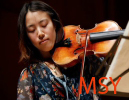.
Happy and relaxed at half way mark on this Saturday!
 |
| 'Koiraparkki = Dog Parking' |
SATURDAY 17.7.
A Festival of Two Worlds
25 11.00 Kuhmo Arts Centre €14.50/10.50
“Heaven wouldn't be what it is if one couldn't hear my husband’s music.”
Anna Magdalena Bach
J.S. Bach (1685–1750):
Suite No. 4 in E flat, BWV 1010 for Solo Cello
Geringas
Trio Sonata in D minor, BWV 1036
Seo, Gleisner, Luoma, Zahharenkova
Suite No. 5 in C minor, BWV 1011 for Solo Cello
Maintz
26 13.30 Kuhmo Arts Centre €14.50/10.50
W.A. Mozart (1756–1791):
String Quintet in D, K. 593
Meta4, Mendelssohn
Clarinet Quintet in A, K. 581
Sundqvist, Danel Quartet
27 15.00 Kontio School €14.50/10.50
Myth and Temptation
Claudio Monteverdi (1567–1643):
Toccata, Sinfonias and Moresca from Orfeo, SV 318
Pirinen, Rönkä, Ardeo Quartet, Simon, Pedrini, Nurminen
Christoph Willibald Gluck (1714–1787):
Dance of the Blessed Spirits from Orpheus and Eurydice
Thomsen, Mitchell, Bogdanas, Stasevska, Wilson, Zahharenkova
Joseph Haydn (1732–1809):
Baryton Trio in A, Hob XI:5 (Aria Che faró senza Euridicé from Gluck's Orpheus and Eurydice)
Geringas, Mendelssohn, Maintz
Philip Glass (1937–):
The Orphée Suite for Piano (transcribed by P. Barnes)
Rucli
Jacques Offenbach (1819–1880):
Encore: Can-Can from Orpheus in the Underworld
Kuusisto, H. Kärkkäinen
28 18.00 Kontio School €19.50/14
A Festival of Two Worlds
The lowest circle of Hell. Contrary to prevailing opinion, it is inhabited neither by despots nor by matricides, not even by those who go after the bodies of others. It is a refuge for artists, full of mirrors, musical instruments and pictures. At first glance this is the most luxurious infernal department, without tar, fire or physical torture. Throughout the year competitions, festivals, concerts are held there. There is no climax in the season. The climax is permanent and almost absolute. Every few month new trends come into being and nothing, it appears, is capable of stopping the triumphant march of the avant-garde. Belzebub loves art. He boasts that even his choruses, his poets and his painters are nearly superior to those of heaven. He who has better art has better government - that's clear. Soon they will be able to measure their strength against one another in the Festival of the Two Worlds. And then we will see what remains of Dante, Fra Angelico and Bach. Belzebub supports the arts. He provides his artists with calm, good board and lodging and absolute freedom from the hellish life. Zbigniew Herbert
Giuseppe Tartini (1692–1770):
Violin Sonata in G minor "Devil’s Trill"
Shaham, Jumppanen
François Couperin (1668–1733):
Dance du diable for Harpsichord
Schmidt
Luigi Boccherini (1743–1805):
Symphony in D minor, G. 506 "La casa del diavolo"
Seo, Gleisner, Tapani, Joulain, Ardeo Quartet, Lindroos, Schmidt
Intermission
Jouko Tötterström (1956–):
Three Poems from the Afterworld for Clarinet, Cello and Piano
Lethiec, Lehto, Mikkola
Frédéric Chopin (1810–1849):
Grand Duo in E, on themes from Mayerbeer's Robert le Diable for Cello and Piano
Rousi, Lagerspetz
Alexandr Skryabin (1872–1915):
Poème satanique in C, Op. 36 for Piano
H. Kärkkäinen
Franz Liszt (1811–1886):
Mefisto Waltz No. 1, S. 514 for Piano "The Dance at the Village Inn"
Resjan
Johann Strauss (1825–1899):
Lucifer Polka, Op. 266
Kuusisto, Yang, Maijala, Pulkkinen, Simon, Gröndahl, Malmivirta
29 21.15 Kuhmo Arts Centre €36.50/22.50
The Iron Curtain between God, Communism and the Voice of America
Anatolijus Senderovas (1945–):
David's Song for Cello and String Quartet
Geringas, Ardeo Quartet
Serban Nichifor (1954–):
String Quartet
Enescu Quartet
György Ligeti (1923–2006):
Sonata for Violoncello Solo
Geringas
Intermission
Gems of the Proletkult
Georg Friedrich Handel (1685–1759):
Suite in D minor for Harpsichord
Zahharenkova
Handel’s image of a religious mystic detached from the class struggle is part of the capitalist mystification intended to cut off the working people from their cultural inheritance and to make their exploitation easier. His choruses represented the people suffering, fighting and triumphing, and his dances were used to combat the Pietist devoutness of his feudal oppressors by showing that his art belonged to the people.
Aufgaben und Ziele unserer Händelpflege
SED Hauptabteilung Kulturelle Beziehungen - Ministerium für Kultur 27/2 1958
Die Partei hat immer recht
Katajala, Packalén, Kuusela, Lethiec, de Groot, Ferchen, Nurminen
The liberal bourgeoisie saw Bach exclusively as a church musician; every artistic connection with the struggle of the simple people present in his suites, his concertos, even his profane cantatas was covered up. In the period of imperialism, the bourgeoisie promoted Bach as a cosmopolitan church formalist musician devoid of content. The SED (Sozialistische Einheitspartei Deutschlands) is right in exposing the falsified aspect of German culture in the “Americanised” West. Art for the masses has been replaced by erotic magazines, cops and robbers novels, and films in which the mentally ill and gangsters appear as heroes. If composers there do not write Boogie-woogie rhythms or abrasive neo-fascist marches, they vegetate in poverty. In the Bach Year, 1950, we will defend our national culture against all destructive and divisive efforts of American imperialism.
Stellungsnahme des Parteivorstandes der SED zum Bach Jahr
Anlage nr 4 zum Potokoll Nr 76 vom 13 März 1950
J.S. Bach (1685–1750):
Coffee Cantata, BWV 211
Hata, Katajala, Torikka, Seo, Roussev, V. Szigeti, Stasevska, Luoma, Lindroos, Schmidt
Ludwig van Beethoven (1770–1827):
Piano Sonata No. 23 in F minor, Op. 57 "Appassionata"
Jumppanen
Intermission
Aram Khachaturian (1903–1978):
We Live in an Enviable Time
Haller, Rucli
Louis Armstrong:
What a Wonderful World
Torikka, Lethiec, Malmivirta, M. Kärkkäinen, de Groot, Ferchen, Nurminen
Contrary to the prevailing belief, the Louis Armstrong masterpiece is not by Louis Armstrong. The two fathers of the “Wonderful World” were Bob Thiele and George David Weiss. Armstrong merely protected them from the hellish life and consequences of being famous.
Dmitry Shostakovich (1906–1975):
String Quartet No. 8 in C minor, Op. 110
Danel Quartet
Shostakovich, in a reply to an American music critic:
I want you to know, Mr. Taubman (music critic on the New York Times), that we in the USSR are used to greater freedom than people in any of the bourgeois countries: freedom from exploiters, from bribery, from bourgeois publishers, etc. I can assure you, Mr. Taubman, that I've always heeded the voice of public opinion, so vital to me in my creative work.
March of the Soviet Militia, Op. 139
Thomsen, Rönkä, Lethiec, Luoma, Tapani, M. Kärkkäinen, Kemppainen, Ferchen, Nurminen
Louis Armstrong:
When the Saints Go Marching in (trad.)
Torikka, Lethiec, Pirinen, Malmivirta, Bogino, de Groot


































































































No comments:
Post a Comment